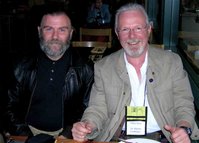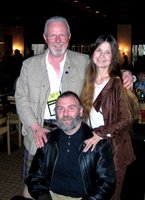Thirty years ago I was best man at the wedding of Bill and Tanya Hill at Martha Street registry office in Glasgow.
It is more than twenty years since I last set eyes on them.

This morning we met again, the three of us, in a hotel lobby in Seattle, and it was as if all the years in between had never been. We went upstairs to the cafe and shared brunch. We talked for three hours, built fragile bridges that spanned the time in between, and saw in one another the people we had once been - and still are.
But we have come such a long way, all of us, since those early days when Bill and I first met as cub reporters on a local daily newspaper in the provincial Scottish town of Paisley. We moved on then to Scotland's top broadsheet, "The Scotsman", where we sat across a desk from one another for nearly five years.
But we shared so much more than a job. We spent many hours together writing and playing and recording music, talking, dreaming - knowing that the future must hold more than the present. But neither of us could have dreamt then where it would take us, and that all these years later we would be grinning at one another like idiots across a cafe table in the Pacific Northwest of the United States.
Bill's story is one of extraordinary achievement against the odds. Born and brought up in a working class housing project in the notorious east-end of Glasgow, his father died when he was just fourteen, and he took on the mantle of man of the house, and breadwinner.
But Bill wasn't just a hard worker. He was smart. Really smart. He sat an exam and won a scholarship to one of Glasgow's top private boys' schools, Alan Glen's, where he excelled academically. But he was also a rebel, and rejected the conventional academic route through university, finally to carve out a niche for himself as a journalist. But with his long hair and thick, bushy beard, and his restless talent, he pushed at the boundaries of accepted convention. Spotted once by a rival newspaper busking in Buchanan Street in Glasgow on a Saturday afternoon, he was hauled over the coals by the editor of "The Scotlsman" after a story appeared in the gossip column of a Sunday tabloid, suggesting that "Scotsman" reporters were paid so poorly they had to go busking to make ends meet.
Of such things are legends made.
I left newspapers in 1979 to pursue a career as a writer, and over the next few years we lost touch. On a return visit one day to "The Scotsman", I learned that Bill had left to join a software company in Edinburgh. Seismic shift! And it wasn't until about five years ago that I discovered that Bill had gone on to distinguish himself in the field, co-inventing ClearType - a revolutionary way of presenting type on computer screens.
Head-hunted by Microsoft here in Seattle, Bill went through a rigorous interview process - not dissimilar to the selection procedure employed by the Ecole Nationale d'Adminstration (ENA) in France. Offered a job and welcomed aboard a company that was shooting for the stars (and getting there), he found that while his IQ of nearly 160 had usually made him the brightest guy in any gathering, he was now - in his own words - the dumbest guy in the room.

Which is typically self-effacing and, of course, belies the fact that he went on to become one of the brightest stars in the Microsoft constellation - finding himself addressing audiences of 3000 people and sharing the stage with one of the world's richest and best-known men, Bill Gates. Wearing his kilt, naturally (Bill H, not Bill G).
Bill's new life was telegraphed to him in a dream, where he saw wolves appearing through a breach in thick clouds, beyond which he caught sight of a star-studded sky. Whereupon he, himself, turned into a wolf and found himself running with other wolves through the woods.

He now lives in those wild woods outside Seattle, absorbing the wisdom of native Americans learning how to track and follow the very wolves he had once joined in his dreams. His wife, Tanya, has reflected those dreams in a wonderfully evocative series of paintings, and Bill returned to his musical roots to write and record an album of songs that tell the story.
They have a house in Hawaii, right down on the beach. At nearly fifty-eight Bill is learning to surf. He faces life fearlessly following a stroke ten years ago that nearly robbed him of his life (it was a stroke that killed his father, aged 44). "It made me not afraid any more," he told me. "To face life, to express myself, to stand up in front of three thousand people... I'm glad now that it happened."
He grinned at me. "Sometimes I find it hard to believe I'm here in Seattle, living this life, that I've come this far, by this route.. wee Willie Hill fae Barlanark."
It was an emotional reunion. And when, finally, we parted, we hugged, and our lives went off again on their separate and very different ways. And I found it hard to believe, and almost as hard to accept, that we should meet so briefly after all this time, and might never meet again.
Isn't life strange?
*******************************************
Following my reunion with the Hills I went to sign books for the good folk of the Seattle Mystery Bookshop, and had the privilege of meeting the store's founder, Bill Farley...





No comments:
Post a Comment